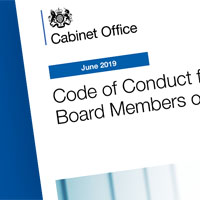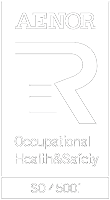Tratos has adopted the Code of Conduct for public appointment
Tratos expects all holders of board office to work to the highest personal and professional standards. In support of this, all non-executive and executive board members of Tratos must abide by the principles set out in this Code of Conduct. The Code sets out, clearly and openly, the standards expected from those who serve on the boards of UK public bodies and should form part of individual members’ terms and conditions of appointment. It also makes clear that harassing, bullying or other inappropriate or discriminatory behaviour is not consistent with what is expected of a board member of UK public bodies and will not be tolerated. Any breach of the Code should be viewed as a breach of the terms of appointment.
The principles set out in this code apply to all non-executive members on the boards of government departments, non-ministerial departments, executive agencies, non-departmental public bodies (NDPBs) and national public corporations.
The Code complements a public body’s governing documents (legislation, memorandum and articles of association, royal charter) and any administrative documents (framework agreements, memoranda of understanding) which may set out the responsibilities and obligations of its board members. The Code’s provisions must be observed alongside the provisions set out in these documents.
This Code replaces the Code of Conduct for Board Members of Public Bodies issued by the Cabinet Office in 2011. This Code can be found online at https://www.gov.uk/public-bodies-reform
In the first instance, any propriety and ethics issues should be raised with the senior responsible official within your sponsoring department, or the Permanent Secretary as necessary. If additional advice is required, any questions should be directed to the Cabinet Office on:neil.ancell@tratosgoup.com

1. Introduction
As a public office holder, your behaviour and actions must be governed by the principles set out in this Code of Conduct. It is your responsibility to ensure that you are familiar with, and comply with, all the relevant provisions of the Code.
2. Key principles of public life
The key principles upon which this Code of Conduct is based are the Seven Principles of Public Life1. These are
3. General Conduct
You have a duty to ensure the safeguarding of public funds3 and the proper custody of assets which have been publicly funded…
4. Conflicts of Interests
When accepting an appointment to the public body you should consider if any conflicts of interest arise from your private interests or by virtue of any other roles you hold. You should consider, with advice from the appointing department how these should best be managed, and agree these with the organisation.
5. Responsibilities as a board member
You should play a full and active role in the work of the body. You should fulfil your duties and responsibilities responsibly and, at all times, act in good faith and in the best interests of the body.
6. Responsibilities towards employees
You will treat any staff employed by the body with courtesy and respect. It is expected that employees will show you the same consideration in return. You will not ask or encourage employees to act in any way which would conflict with their own Code of Conduct.
7. Social media
Social media is a public forum and the same considerations, including the provisions of this Code, apply as would to speaking in public or writing something for publication, either officially or in a personal capacity.
8. Raising concerns
You should ensure that the body has an open, transparent and safe working environment where employees feel able to speak up and raise concerns, and complaints procedures are clearly communicated to them.









